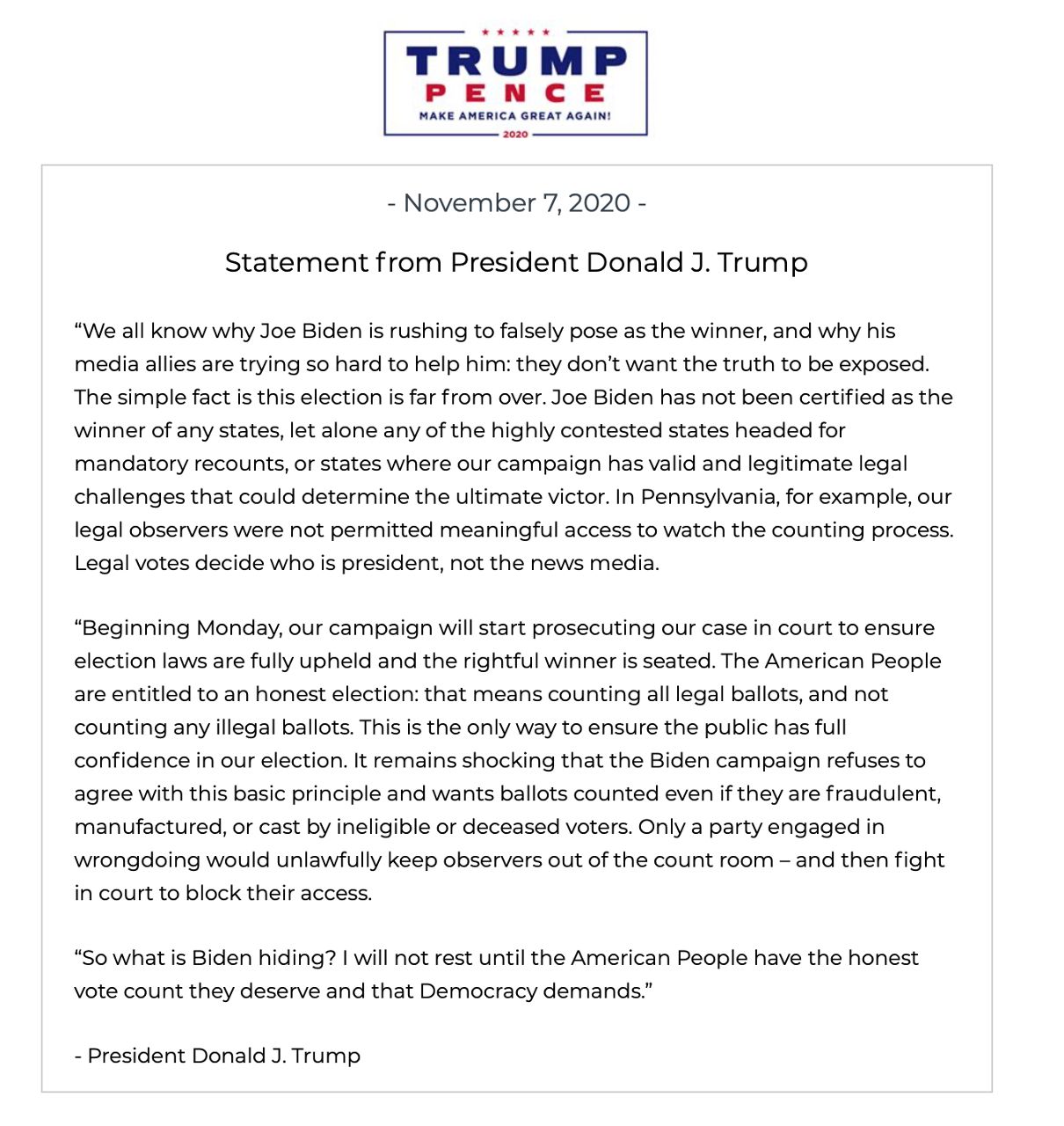Joseph Robinette Biden, Jr., a moderate former vice president whose personal story of tragedy and resilience resonated with a nation reeling from the coronavirus pandemic, is projected to become the 46th President of the United States.
Dr. Jill Biden posted a photo to Twitter on Friday, showing the president-elect wearing a hat saying "We just did." with the number 46.
Soon after the Associated Press projected Biden clinched the required Electoral College votes to clinch the White House, the presumed president-elect released a statement thanking the American people for placing their trust in him.

“I am honored and humbled by the trust the American people have placed in me and in Vice President-elect Harris,” the statement began.
“In the face of unprecedented obstacles, a record number of Americans voted,” Biden continued. “Proving once again, that democracy beats deep in the heart of America.”
Biden said that as the campaigns have come to an end, it’s time for the country to “put the anger and the harsh rhetoric behind us and come together as a nation.”
“We are the United States of America. And there’s nothing we can’t do, if we do it together,” the statement concluded.
Biden made no mention of his opponent, President Donald Trump, who has not conceded the race. Trump was at his Virginia golf course Saturday when the presidential race was called for Biden.
In his own statement following Biden’s projected win, Trump claimed the election is “far from over.”

"We all know why Joe Biden is rushing to falsely pose as the winner, and why his media allies are trying so hard to help him: they don’t want the truth to be exposed,” the president’s statement began. “The simple fact is this election is far from over. Joe Biden has not been certified as the winner of any states, let alone any of the highly contested states headed for mandatory recounts, or states where our campaign has valid and legitimate legal challenges that could determine the ultimate victor. In Pennsylvania, for example, our legal observers were not permitted meaningful access to watch the counting process. Legal votes decide who is president, not the news media.”
Trump’s campaign had previously filed numerous lawsuits across several battleground states, including Pennsylvania, claiming – without evidence – that voter fraud was swaying the outcome of the election in Biden’s favor.
Judges in Georgia and Michigan quickly dismissed Trump campaign lawsuits Thursday, and one suit in Pennsylvania was tossed out as well. The Trump campaign did score one victory with an appellate court ruling to get party and campaign observers closer to election workers who are processing mail-in ballots in Philadelphia.
But the order did not affect the counting of ballots in Pennsylvania and elsewhere, as election officials dealt with an avalanche of mail-in ballots driven by fears of voting in person during a pandemic.
Still, Trump pledged to continue his fight against the election outcome, saying in his statement that the American people are “entitled to an honest election.”
“Beginning Monday, our campaign will start prosecuting our case in court to ensure election laws are fully upheld and the rightful winner is seated,” the statement read in part. “The American People are entitled to an honest election: that means counting all legal ballots, and not counting any illegal ballots. This is the only way to ensure the public has full confidence in our election.”
“It remains shocking that the Biden campaign refuses to agree with this basic principle and wants ballots counted even if they are fraudulent, manufactured, or cast by ineligible or deceased voters. Only a party engaged in wrongdoing would unlawfully keep observers out of the count room – and then fight in court to block their access,” the statement continued.
Election officials across multiple states have maintained that there is no widespread evidence of voter fraud. Still, Trump said he would “not rest until the American People have the honest vote count they deserve and that Democracy demands.”
It is true that in most states, the winner of the election cannot be certified until up to several weeks after the election due to legal procedures in place. But with the Associated Press projection that Biden has won Pennsylvania and Nevada and is closing in on Georgia, it seems the election is all but over.
Biden would be the first president since 1992 to unseat a sitting incumbent president, and just the second in 40 years. At 78 upon his expected inauguration January 20, the former vice president will be the oldest president in United States history. Biden’s running mate, Senator Kamala Harris of California, will also make history – she will be the first woman, the first Black woman and the first woman of Asian descent to serve as Vice President of the United States.
Only a handful of incumbent U.S. presidents who have run for another term in office were not reelected:
- George H.W. Bush (1992, lost to Bill Clinton)
- Jimmy Carter (1976, lost to Ronald Reagan)
- Gerald Ford (1976, lost to Jimmy Carter)
- Herbert Hoover (1932, lost to Franklin Delano Roosevelt)
- William Howard Taft (1912, lost to Woodrow Wilson)
- Benjamin Harrison (1892, lost to Grover Cleveland)
- Martin Van Buren (1840, lost to William Henry Harrison)
- John Quincy Adams (1828, lost to Andrew Jackson)
- John Adams (1800, lost to Thomas Jefferson)
(Grover Cleveland is a curious case — he lost to Benjamin Harrison in the election of 1888, but defeated Harrison in the election of 1892. Cleveland was both the 22nd and 24th President of the United States and is the only president in U.S. history to serve two non-consecutive terms in office.)
Andrew Johnson and Franklin Pierce were both one-term presidents who lost their party’s nominations.
Johnson lost the Democratic nomination at the Democratic Convention of 1868 to former New York Gov. Horatio Seymour, who was defeated handily by Ulysses S. Grant.
Pierce lost the Democratic nomination at the Democratic Convention of 1856 to James Buchanan, who defeated former president Millard Fillmore (who lost to Pierce in the Election of 1852 and switched from the Whig Party to the Know Nothing Party) and Republican nominee John C. Frémont.
The projected victory has Biden winning at least 284 electoral votes, according to an Associated Press tally utilized by Spectrum News – 14 more than was needed, with the number potentially growing as returns from Nevada and Georgia are processed and, at least for Georgia, recounted. At nearly 75 million, Biden’s nationwide popular vote is expected to set a record – and while the margins are narrower than some projected, it nonetheless a repudiation of President Donald Trump’s four years in office.
At the same time, the news amplified deep uncertainty in the nearly 250-year old American democratic experiment, with Trump repeatedly casting doubt on the election’s validity with a series of unfounded allegations of fraud and vote-rigging. Vowing to take the cause to the Supreme Court, Trump’s campaign has launched multiple lawsuits, though so far none altered the trajectory of the race.
The actions revealed an emerging legal strategy that the president had signaled for weeks, namely that he would attack the integrity of the voting process in states where the result could mean his defeat.
At issue are vote-counting procedures in key states that saw Trump’s sizable leads diminish over three days of tense tallying. The reason why his numbers steadily decreased is straightforward: in those states, laws forbade mail-in ballots, which tended to favor Biden and take longer to process, from being counted before the start of in-person voting, which tended to favor Trump.
Biden had appealed to Americans to vote by mail as part of a larger campaign strategy, preaching caution in the face of the coronavirus pandemic that has killed more than 235,000 Americans. Without evidence, Trump consistently called mail-in voting prone to fraud, and he encouraged his supporters to vote in person instead.
What will happen next remains an unclear, potentially troubling chapter in American history, at least when combined with the numbing series of events 2020 has already unleashed. Other presidential contenders have challenged elections – most famously in 2000 – but it remained uncertain at the moment whether the President would abide by the election and engage in the traditional formalities of presidential transitions.
Whether such a strategy would attract widespread support from Republicans and Trump allies also remained unclear; as of late Thursday, several key Republicans and media figures appeared to be cooling to the notion Democrats had done anything improper.
On Wednesday, the day after Election Day, Biden said that he expected to win the White House, though he stopped short of outright declaring victory.
Biden preached a message of unity to a nation wracked with division, telling supporters in Delaware: "To make progress, we have to stop treating our opponents as enemies. We are not enemies. What brings us together as Americans is so much stronger than what can tear us apart."
“I will govern as an American president,” Biden continued. “There will be no red states and blue states when we win. Just the United States of America.”
He echoed these themes in a late-night address to the nation Friday night.
The high-stakes election was held against the backdrop of a historic pandemic that is growing in much of the country, overwhelming hospitals. Millions of jobs have been wiped away, though the unemployment rate fell in October, with the U.S. adding 638,000 jobs and the unemployment rate falling to 6.9 percent – almost double what it was in February.
Months later, voters braved worries of the coronavirus, threats of intimidation at the polls and expectations of long lines caused by changes to voting systems, but turnout appeared undeterred and easily surpassed the 139 million ballots cast four years ago, though much of the ballots were mailed.
Biden had pledged numerous times throughout his campaign to tackle the coronavirus pandemic “on day one” of his presidency, heavily criticizing his opponent for his blatant disregard for social distancing guidelines at rallies in the leadup to Tuesday. The President has said the nation had rounded the corner, with a vaccine expected shortly.
Trump’s current term doesn’t end until Jan. 20. In the 80-plus days until then, 100,000 more Americans will likely die from the virus if the president doesn’t shift course, said Dr. Robert Murphy on Wednesday, executive director of the Institute for Global Health at Northwestern University’s Feinberg School of Medicine, echoing estimates from other public health experts.
Polls showed the public health crisis and the economy were top concerns for many Americans. In addition to differing paths on the outbreak, the candidates spent months pressing dramatically different visions for the nation’s future, including on racial justice and environmental policy.
The projected victory was a remarkable political journey for Biden, who had tried and failed to win the post twice before – in 1988 and again in 2008, when a distant showing led to his nomination as Barack Obama’s running mate. Biden’s major contribution during Obama’s two terms is seen as shepherding the spending of a major stimulus package after the 2008 financial crisis.
After deferring to Hillary Clinton in 2016, Biden said he entered the race in his eighth decade after witnessing the President’s response to a 2017 white nationalist rally in Charlottesville, Virginia.
After a lackluster start in a crowded presidential field, the South Carolina primary resuscitated Biden’s candidacy, as voters there, particularly African-Americans, and then increasingly elsewhere, saw his middle-of-the road outlook and fond memories of his time beside Obama as the surest path to political victory against a President Democrats wanted to beat.
But it is Biden’s personal story, and not political doings, that seemed to endear him to voters in this era of loss. In 1972, Biden’s wife and baby daughter were killed in a car accident while Christmas tree shopping. Biden’s two sons, Beau and Hunter, were also injured in the crash. Biden would commute daily from Delaware to Washington, D.C., to see his sons.
After a career in public life that included election as Delaware’s Attorney General, Beau Biden died of brain cancer in 2015.
At public events, Biden is often approached by those in mourning – at least until COVID-19 halted such intimate interactions.
The Associated Press contributed to this report.



